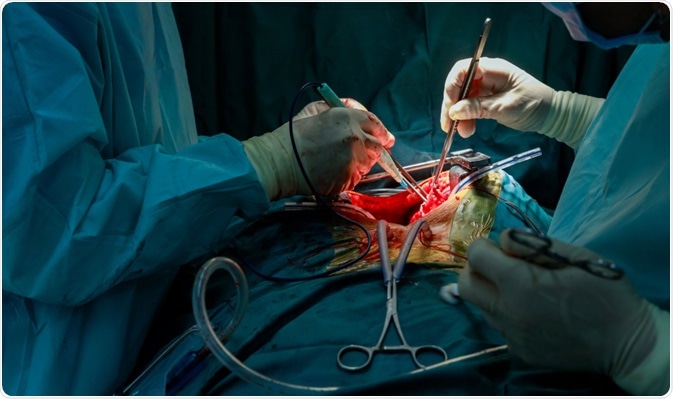Lung cancer is a common and serious type of cancer that is considered to be the most common type of cancer to affect people worldwide. In fact, at the end of 2018, about 2.1 million new cases of lung cancer were diagnosed, with 1.8 million people dying from this type of cancer that same year.

Image Credit: create jobs 51 / Shutterstock.com
People affected by lung cancer do not usually develop symptoms in the early stages of the condition; however, they may eventually develop a persistent cough, start coughing up blood, feel breathless, experience unexplained fatigue and weight loss, as well as painful breathing or coughing.
Types of lung cancer and surgical options
The two main types of lung cancer are non-small cell lung cancer and small cell lung cancer. Surgery is generally used to treat non-small cell lung cancer.
Comparatively, small cell lung cancer is not usually treated with surgery unless it is in the very early stages, as this form of lung cancer has usually spread beyond the lung by the time it has been diagnosed, thereby eliminating the ability of surgery to remove all tumors by this stage. Generally, chemotherapy and radiotherapy are used to treat small cell lung cancer.

Image Credit: ungvar / Shutterstock.com
Surgery for lung cancer may involve removing a portion of the lung or the entire affected lung. A procedure where the lung cancer and a small portion of healthy tissue are removed is called a wedge resection, whereas removal of a larger portion of the lung is referred to as a segmental resection. Thirdly, surgery to remove one of the lobes of the lung is called a lobectomy. When the entire lung is removed, the procedure is called a pneumonectomy.
Wedge resection
A wedge resection involves removing a small, wedge-shaped area of the lung that contains the cancer, along with some of the surrounding healthy tissue. This operation is only performed when the physician thinks cancer has been diagnosed while it is in the early stages and is only present in one very small area of the lung.
A wedge resection may also be performed to diagnose lung cancer. If a specialist believes the cancer has spread to another area of the lung, they will not recommend this procedure.
Segmental resection
Segmental resection or segmentectomy involves the removal of a larger portion of the lung as compared to that which is removed during a wedge resection, although the whole lobe is still not removed.
Facing Lung Cancer: Surgery—What to Expect?
Lobectomy
A pulmonary lobectomy is a common procedure where a lobe of the lung that contains cancerous cells is removed. There are three lobes in the right lung and two lobes in the left; therefore, the lungs can still function with the lobes that remain.
When two lobes are removed, the procedure is referred to as a bilobectomy. A specialist will recommend this procedure if they believe that the cancer is presenting in just one area of the lung. This is the most commonly used operation for treating lung cancer.
Sleeve resection
A small proportion of people with lung cancer undergo an operation called a sleeve resection. This may be performed in order to avoid removing the entire lung if the cancer is located within a central area of the lung and is growing into one of the bronchi. The affected bronchial tissue is removed, along with any surrounding cancer in the lobe.
Pneumonectomy
Removal of the entire lung is recommended if the tumor is in the central area of the lung and involves either the two left lobes or the three right lobes. People can still breathe normally with only one lung, but a doctor will organize a breathing test before surgery to diagnose any existing breathing problems and help a patient decide whether this type of surgery is suitable for them.
Keyhole surgery for lung cancer
Sometimes, surgeons can use keyhole surgery to remove non-small cell lung cancers that are in the very early stages. A flexible tube with a camera attached to it is passed through a small cut in the chest, allowing the surgeon to examine the lungs with the assistance of video guidance. A small number of cuts are then made in the side of the chest, through which surgical instruments can be inserted to perform the surgery.
References
Further Reading
Last Updated: Jul 18, 2023